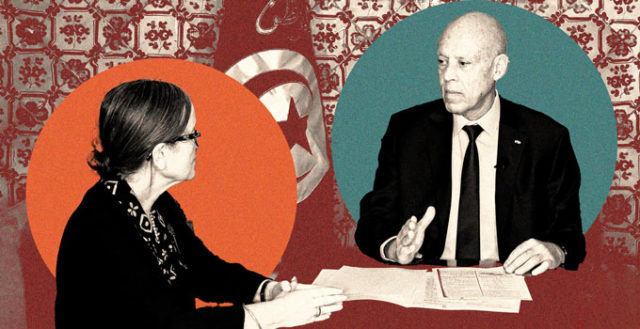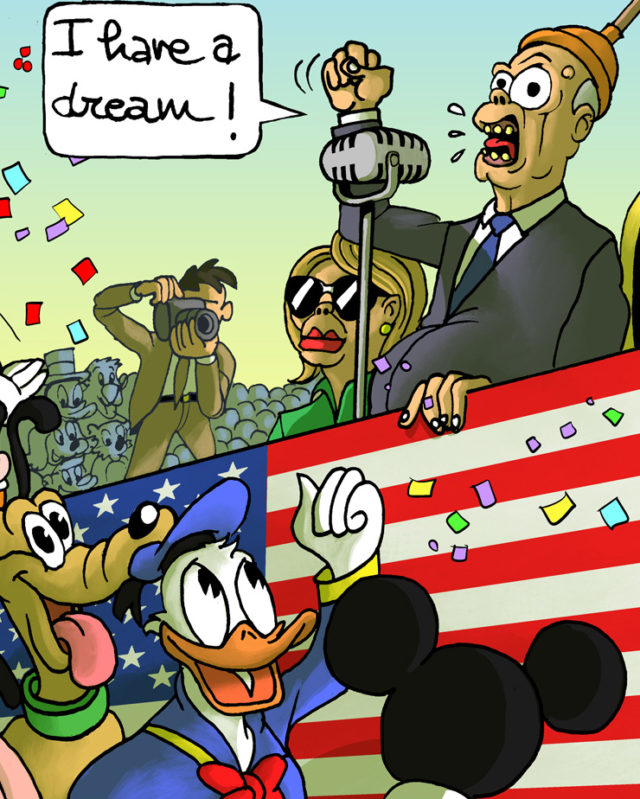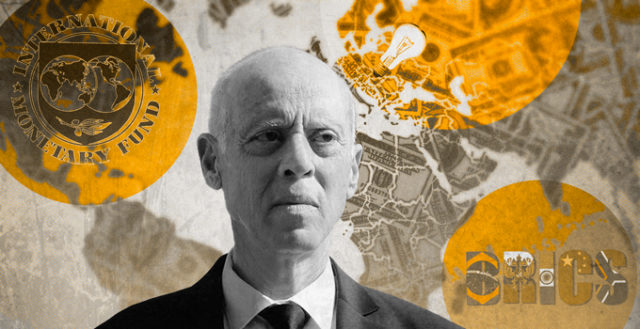Over the past year, Tunisians have struggled to keep their pantries stocked. Necessities, especially staple food items, are often missing from the shelves of local grocery stores and supermarkets. These ongoing shortages have more than one cause.


Over the past year, Tunisians have struggled to keep their pantries stocked. Necessities, especially staple food items, are often missing from the shelves of local grocery stores and supermarkets. These ongoing shortages have more than one cause.

Her departure from the Kasbah has been as discreet as her arrival. A late night post on the Office of the President’s Facebook page informed Tunisians of Prime Minister Najla Bouden’s dismissal from office. After less than two years serving at the head of government, this unassuming university professor is leaving the field with an underwhelming track record in confronting socioeconomic issues. What is remarkable about Bouden’s term is how she stood by an increasingly authoritarian regime.

President Kais Saied’s time in power has been anything but uneventful. However, his claims of speaking for ‘the people,’ his hatred of any institution that stands in his way and his endless conspiracies, which dominate the public conversation while the economy sinks, all have parallels. They’re there in Donald Trump, Hugo Chavez and even Silvio Berlusconi.

President Saied’s hostile remarks about IMF injunctions have stirred public debate around economic alternatives to pull Tunisia out of crisis. The struggle is bitter between adepts of the classic « structural adjustments » prescribed to save flailing economies, and adherents of the president’s magical thinking-based approach.

The Tunisian market for secondhand clothing, known as « fripe », emerged after the second world war. The industry has since become ingrained in the country’s socioeconomic fabric, anchored in consumer habits and constituting a livelihood for more than 200 thousand individuals. But the sector is facing an unprecedented crisis.

In early May, an official delegation to Washington D.C. met with International Monetary Fund (IMF) officials for discussions on a new loan program for Tunisia. According to a leaked, confidential document allegedly produced by the Tunisian government which Bloomberg reported on (but did not publish), the government proposed removing food and energy subsidies as part of these discussions. In May and June, the prices of several consumer goods, including subsidized sugar, were raised or increased. Some have claimed these price increases were meant to “appease” the IMF as part of the ongoing loan discussions.

A sea of cars fills the street from Bab Alioua to Bab Jazira. Dozens of people carrying plastic bags are on the lookout for available taxis which are few and far between. The closer one gets to Boumendil, the thicker the crowd becomes. In this souk, a hub for contraband, life is returning to normal as Aid draws near. But the threat of Coronavirus hovers all along this street that is teeming with foot traffic.

On March 16, Tunisian Prime Minister Elyes Fakhfakh announced a series of decisions that were not without economic consequences. Beyond the closure of air and land borders (except to goods and to flights carrying Tunisians returning from abroad), Fakhfakh announced the cancellation of all cultural, scientific and sports events. These new measures were implemented in addition to the 4pm closing time imposed on cafés, restaurants and bars. The pandemic is taking a toll on the global economy, and Tunisia has not been spared.

Another hot summer in Tunisia gave way to teachers’ strikes in the fall, while winter follows suit with plans for a general strike on January 17. In this context, on December 10 the government adopted the Finance Law of 2019, a package of measures that perpetuate fiscal injustice, aiming to handle the country’s growing deficit by reaching into the pockets of those most impacted by economic crisis. Ahead of the 2019 elections, the new public budget was passed amidst a rejection rate of 30% in parliament, suscitating a new wave of popular and political rejection in the most recent test put to the government of prime minister Youssef Chahed.

This publication file is in the framework of the activities of the network of independant media on the Arab world. The regional cooperation is made by Al-Jumhuriya, Assafir Al Arabi, Mada Masr, Maghreb Emergent, Mashallah News, Nawaat, 7iber and Orient XXI.

In recent years, Egyptians have experienced a noticeable decline in their standard of living with the devaluation of the national currency and at the same time a substantial rise in the cost of goods and services. Something quite unusual in a country where over the past few decades changes have always been gradual. Egyptians interpret their difficulties as a consequence of the implementation of the “Economic reform” aimed at bringing the country out of the current crisis with a series of austerity measures decided by the IMF.

The second Intifada used a large network of parallel and informal financial assistance to provide material and logistical support to the Palestinian resistance. That is why Israel has imposed reforms on the Palestinian Authority that have played a decisive role in its control strategy. Presented as a step towards good governance and the fight against corruption, they contributed to the halt given to the Intifada after the death of Yasser Arafat.

Despite the supposedly opposing political systems in place in Egypt and Syria since the 1970s, the two countries have developed similar economic reforms, particularly since the 1990s. In both cases, and beyond the differences, they allowed the elites to strengthen themselves, and the dictatorship to continue.

In North Africa, central banks independence from political powers is a matter of debate. It faces many obstacles and also raises countless criticisms from those who fear that countries will abandon their national sovereignty.

According to official figures, 11 billion dinars are currently circulating outside the Tunisian banking system. This calls for a constant refinancing of banks by the Tunisian Central Bank, due to the resulting lack of liquidity. Many factors may account for this situation, namely the size of the informal sector and the low rate of bancarization standing at 47% of the population. While this has been the case for many years, the situation could deteriorate in 2018 and 2019.

Tunisia placed 87 out of 136 countries ranked in the 2017 Tourism Competitiveness Index, an assessment prepared by the World Economic Forum. According to the Index report released on April 5, Tunisia dropped down 8 points from its position in the previous year, owing to « low safety and security…with terrorism emerging as a destabilizing force…which in turn has led to high costs on business…and an extremely rigid and uncompetitive labour market. » The same week, the Tunisian Federation of Hotels proposed a debt restructuration plan as a life line for the country’s tourism industry. The sector is weighed down by a staggering 4 billion dinars in debt according to the Federation, and the Central Bank of Tunisia reports that some 120 out of 800 hotels nationwide are unable to settle their debts.

عقدت مؤسّسة روزا لكسمبورغ بمقرّها في تونس يوم 31 مارس الفارط، الندوة التي استضافت عددا من الباحثين الاقتصاديّين على غرار المفكّر اليساري سلامة كيلة، والأكاديمي والأستاذ الجامعي اللبناني جلبير أشقر، الباحث الاقتصادي والصحفي المصري وائل جمال والأستاذ الجامعي والنائب في مجلس الشعب التونسي فتحي الشامخي إضافة إلى ثلّة من المفكّرين والكتّاب العرب اليساريّين.

From a socio-political perspective, an index that measures “economic freedom” is at first glance misleading. Certainly a significant factor in the discrepancy between The Heritage Foundation’s perspective on poverty and prosperity and the economic, social, and political realities that ordinary citizens face are contrasting interpretations and applications of the word “freedom.” Ironically, many Tunisians who experience what they perceive to be a lack of economic freedom recognize institutions that embrace free-market ideals as culpable for or complicit in economic insecurity.